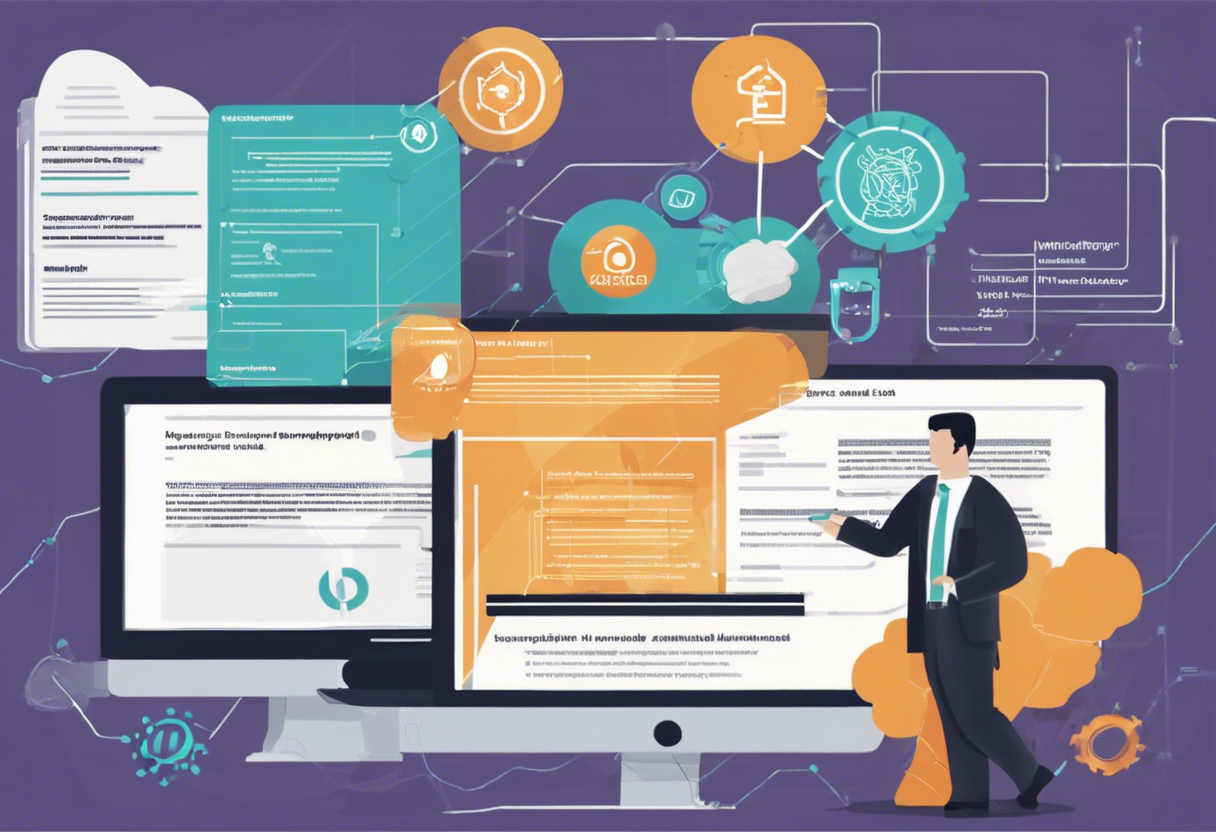The Role of Smart Contracts in Blockchain

The Role of Smart Contracts in Blockchain: Revolutionizing the Way We Do Business
The blockchain revoloution has brought about a paradigm shift in the way we conduct transactions, store data, and interact with one another. At the heart of this revolution lies the concept of smart contracts, which have the potential to transform the way businesses operate, making them more efficient, secure, and transparent. In this article, we'll delve into the world of smart contracts, exploring their definition, benefits, and applications, as well as their role in the blockchain ecosystem.
What are Smart Contracts?
A smart contract is a self-executing program that automates the enforcement and execution of a specific set of rules or agreements between two or more parties. These contracts are stored and replicated on a blockchain, ensuring that the terms of the agreement are tamper-proof and transparent. The code that governs the smart contract is triggered automatically when certain conditions are met, eliminating the need for intermediaries and ensuring that all parties adhere to the agreed-upon terms.
Smart contracts were first introduced by Nick Szabo in 1994, but it wasn't until the launch of Ethereum in 2015 that they gained widespread attention. Today, smart contracts are being used in a wide range of applications, from supply chain management to insurance and finance.
The Benefits of Smart Contracts
So, what makes smart contracts so revolutionary? The benefits are numerous, but here are some of the most significant advantages:
Immutable and Transparent
Smart contracts are stored on a blockchain, which means that once they're deployed, they can't be altered or tampered with. This ensures that all parties involved have access to the same version of the contract, eliminating any disputes over the terms.
Automation
Smart contracts automate the execution of agreements, eliminating the need for intermediaries and ensuring that all parties adhere to the agreed-upon terms. This not only saves time but also reduces the risk of human error.
Increased Efficiency
Smart contracts streamline business processes, reducing the need for manual verification and reconciliation. This leads to increased efficiency, reduced costs, and faster transaction times.
Enhanced Security
Smart contracts use cryptography to secure transactions and protect sensitive data. This ensures that all transactions are secure, and the risk of fraud is significantly reduced.
Applications of Smart Contracts
Smart contracts have the potential to transform a wide range of industries, from finance and insurance to supply chain management and healthcare. Here are some examples of how smart contracts are being used in real-world scenarios:
Supply Chain Management
Smart contracts can be used to track goods as they move through the supply chain, ensuring that all parties involved have access to real-time information. This increases transparency, reduces the risk of fraud, and ensures that goods are delivered on time.
Insurance
Smart contracts can be used to automate insurance claims, ensuring that payouts are made quickly and efficiently. For example, a smart contract can be triggered when a flight is delayed, automatically issuing a payout to the airline's customers.
Finance
Smart contracts can be used to create decentralized lending platforms, allowing individuals to lend and borrow funds in a secure and transparent manner. This reduces the need for intermediaries, such as banks, and ensures that transactions are faster and more efficient.
Healthcare
Smart contracts can be used to securely store medical records, ensuring that patients have control over their data and can grant access to healthcare providers as needed. This increases transparency, reduces the risk of data breaches, and ensures that patients receive better care.
Challenges and Limitations
While smart contracts have the potential to revolutionize the way we do business, there are still several challenges and limitations that need to be addressed:
Scalability
Smart contracts are still limited in terms of scalability, with many blockchain networks struggling to handle a high volume of transactions. This can lead to congestion, increased transaction fees, and slower processing times.
Regulation
The regulatory landscape surrounding smart contracts is still unclear, with many governments and regulatory bodies struggling to understand the implications of this emerging technology.
Interoperability
Smart contracts are often limited to a specific blockchain network, making it difficult to integrate with other networks or systems. This can lead to a lack of interoperability, reducing the overall effectiveness of smart contracts.
Security
While smart contracts are secure, they're not immune to attacks. Hackers have targeted smart contracts in the past, exploiting vulnerabilities and stealing sensitive data.
The Future of Smart Contracts
Despite the challenges and limitations, the future of smart contracts looks bright. As the technology continues to evolve, we can expect to see widespread adoption across a range of industries. Some of the key trends to watch include:
Cross-Chain Interoperability
As blockchain networks continue to develop, we can expect to see increased focus on cross-chain interoperability, allowing smart contracts to seamlessly integrate with multiple networks.
Off-Chain Data
Smart contracts will begin to incorporate off-chain data, allowing them to interact with real-world systems and applications.
Artificial Intelligence
AI-powered smart contracts will become more prevalent, enabling contracts to adapt to changing circumstances and make decisions based on real-time data.
Quantum Computing
The development of quantum computing will require smart contracts to evolve, ensuring that they can withstand the increased computing power of quantum computers.
In conclusion, smart contracts are revolutionizing the way we do business, offering a secure, transparent, and efficient way to execute agreements between parties. While there are still challenges and limitations to be addressed, the benefits of smart contracts are undeniable, and their potential applications are vast. As the technology continues to evolve, we can expect to see widespread adoption across a range of industries, transforming the way we live and work.